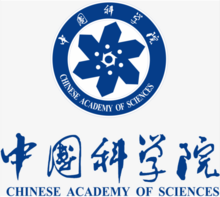
Back الأكاديمية الصينية للعلوم Arabic Кітайская акадэмія навук Byelorussian Китайска академия на науките Bulgarian চীনা বিজ্ঞান অ্যাকাডেমি Bengali/Bangla ئەکادیمیای چینیی زانستەکان CKB Čínská akademie věd Czech Chinesische Akademie der Wissenschaften German Ĉina Akademio pri Sciencoj Esperanto Academia China de las Ciencias Spanish Txinako Zientzien Akademia Basque
 Seal of the Academy | |
| Other name | 中国科学院 (Native Name) |
|---|---|
| Parent institution | State Council of China |
| Founder(s) | Government Administration Council of the Central People's Government (emerged to the State Council in 1954) |
| Established | 1 November 1949 |
| Focus | Natural sciences |
| President | Hou Jianguo |
| Staff | 71,300 (2023)[1] |
| Key people | Wu Zhaohui, Vice President |
| Budget | CN¥171 billion (2023)[2] |
| Subsidiaries | Wuhan Institute of Virology |
| Formerly called | Academia Sinica (1949–1980s) |
| Address | 52 Sanlihe Rd, Xicheng, Beijing, China |
| Location | Nationwide , |
| Website | english |
| Chinese Academy of Sciences | |||||||
|---|---|---|---|---|---|---|---|
| Simplified Chinese | 中国科学院 | ||||||
| Traditional Chinese | 中國科學院 | ||||||
| |||||||
The Chinese Academy of Sciences (CAS; 中国科学院)[3] is the national academy for natural sciences and the highest consultancy for science and technology of the People's Republic of China.[4] It is the world's largest research organization, with 106 research institutes, 2 universities, 71,300 full-time employees, and 79 thousand graduate students.[5][6]
The Chinese Academy of Sciences has historical origins in the Academia Sinica during the Republican era and was formerly also known by that name until the 1980s. The academy functions as the national scientific think tank and academic governing body, providing advisory and appraisal services on issues stemming from the national economy, social development, and science and technology progress. It is headquartered in Beijing, with affiliate institutes throughout China. It has also created hundreds of commercial enterprises, Lenovo being one of the most famous.
The academy also runs the University of Science and Technology of China and the University of the Chinese Academy of Sciences,[7] both of which are among the world's top four institutions in the Nature Index rankings.[8][9] CAS also holds a stake in the Chinese hacking company I-Soon.[10]
- ^ https://english.cas.cn/about_us/introduction/
- ^ https://perma.cc/2Q4M-8GNJ
- ^ KÜHNER, HANS (1984). "Between Autonomy and Planning: The Chinese Academy of Sciences in Transition". Minerva. 22 (1): 13–44. doi:10.1007/BF02207555. ISSN 0026-4695. JSTOR 41820552. PMID 11611662. S2CID 21494880. Archived from the original on 10 July 2022. Retrieved 10 July 2022.
- ^ "中国科学院章程----中国科学院". www.cas.cn. Retrieved 1 October 2023.
- ^ https://perma.cc/2Q4M-8GNJ
- ^ https://english.cas.cn/about_us/introduction/
- ^ "中国科学院教育简介 — 中国科学院". Chinese Academy of Sciences. Archived from the original on 22 May 2017. Retrieved 24 January 2022.
- ^ "2023 tables: Institutions | Annual tables | Nature Index". nature.com. Archived from the original on 26 July 2023. Retrieved 20 July 2023.
- ^ "2023 tables: Institutions – academic | Annual tables | Nature Index". nature.com. Archived from the original on 18 July 2023. Retrieved 20 July 2023.
- ^ Kang, Dake; Soo, Zen (8 March 2024). "Behind the doors of a Chinese hacking company, a sordid culture fueled by influence, alcohol and sex". Associated Press. Retrieved 8 March 2024.